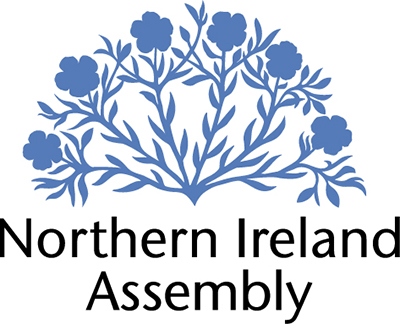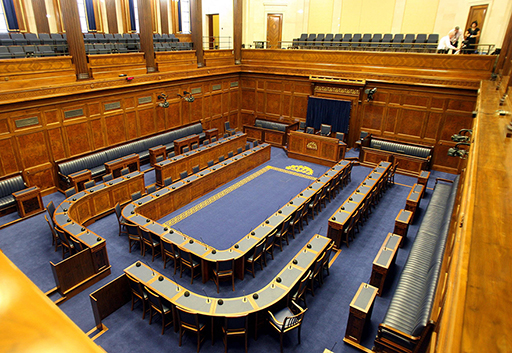3.3 The Northern Ireland Assembly
Work with your Northern Ireland Assembly representative
The Northern Ireland Assembly elects Members of the Legislative Assembly (MLAs). MLAs pass laws and examine policy on issues which have been devolved to the Assembly (see here for more information [Tip: hold Ctrl and click a link to open it in a new tab. (Hide tip)] ) and listen to and act on behalf of their constituents. Like the Scottish and Welsh parliaments, Northern Ireland residents are represented by more than one MLA. There are five MLAs per each of the 18 constituencies across Northern Ireland and 90 MLAs overall.
You can look up your MLAs by postcode here. MLA offices can be contacted by letter, email and phone, with Members holding regular surgeries. Check out the dos and don’ts in Section 2.2 for advice about contacting elected representatives.
MLAs attend Plenary sessions in the Assembly Chamber (usually on a Monday or Tuesday). These meetings are excellent opportunities for MLAs to raise local issues during debates and question ministers on behalf of their constituents, including the First Minister and deputy First Minister. MLAs can also represent their constituents by sending in written questions (which normally receive more detailed responses from ministers than oral questions), table motions for debate (including adjournment debates, which usually relate to specific constituency issues), propose amendments to laws, and introduce private members bills. MLAs therefore have lots of different ways they can represent their constituents, and various opportunities to try and create change.
Assembly business is a matter of public record. You can research your MLAs’ positions on specific policy issues by searching the Assembly Hansard for debates they have participated in. You can also search for Bills they have supported and questions they have asked via the Assembly website.
Submitting evidence to a Committee
Committees are made up of MLAs and focus on a specific government department e.g. Finance, Health and Education. Committees are tasked with holding the Northern Ireland Executive to account, by examining and proposing amendments to legislation, as well as by raising issues by tabling motions for debate in the Chamber. Committees can also propose their own Bills.
They also hold inquiries, and as part of this individuals and organisations can submit written or oral evidence to inform their recommendations (which the Department or relevant minister must respond to). It’s possible to check online what issues committees are currently looking into and the deadline to respond. Committees can also ask someone to speak in person as a witness, if their expertise is deemed relevant to an inquiry.
Committees also call for evidence on Bills, so the public can influence legislation via committees too.
- You can find the current Assembly committees here.
- You can find out more about how NIA Committees work by watching this video.

Transcript: Video 3: Committees of the Northern Ireland Assembly
[MUSIC PLAYING]
Working with All Party Groups (APGs)
All Party Groups (APGs) are made up of MLAs from different parties with an interest in a particular issue. Formal membership is for MLAs only, but individuals and organisations can be invited to attend meetings and give briefings to inform and support the work of the group.
All three designations (Nationalist, Unionist, and Other) at the Assembly must be represented in the membership, which must be made up of at least ten MLAs.
You can see the current APGs and contact details here.
Presenting a petition through an MLA
MLAs can present a public petition, signed by members by the public and requesting government action on a particular issue, to the Assembly. Once approved by the Business Committee, the MLA presents the petition to the Speaker with some introductory words, and the Speaker then arranges for the petition to be sent to the relevant minster. At some point the minister will usually respond to other MLAs and/or the speaker outlining what action has been taken as a result of the public petition.
Making change via North/South collaboration
The North/South Ministerial Council, made up of ministers from the Northern Ireland Executive and Irish Government, co-operates on policy related to 12 areas of mutual interest. Six of these areas are agreed mutually but implemented separately in each jurisdiction. The other six are agreed together but implemented through shared implementation bodies covering both Northern Ireland and Republic of Ireland. Details on how to contact the Council, including areas of interest, are available on this website.
Activity 3: Who to contact?
If you live in the UK you have multiple representatives: a UK Parliament MP, Members of Lords, and potentially devolved representative(s).
In Activity 1 we asked you to think about whether there are any national or international issues you are passionate about and how you could try and make change. Now, take it a step further and think about which representative is the best person to start with:
- Your MP?
- A Member of the Lords?
- A devolved representative?
You will need to research which issues are covered by which legislature (remember, the Scottish Parliament, Welsh Parliament and Northern Ireland Assembly have the power to make laws and deliver public services in certain policy areas devolved to them by the UK Parliament).
You may decide that someone different is better placed to help (this could be a local councillor, an international body, or a pressure group). The Making change globally and Making change outside of parliamentary politics sections will be of interest if so.
If you live outside of the UK, you can also think about which of your own elected representatives (or other organisation/person) is most appropriate for the issue you are interested in.


